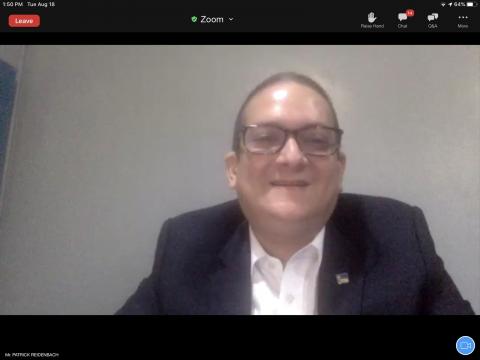
~ Immediate change in mindset first step towards digital transformation
Last Tuesday, 18 August 2020, the Management Association of the Philippines (MAP) held its 6th Online General Membership Meeting. MAP president Atty. Francis Lim opened the session summarizing the association’s efforts in times of pandemic.
MAP easily transitioned to digital delivering GMMs on ICT, digital transformation, platforms, security, etc. “MAP is showing leadership and resilience in a digital ecosystem… with topics that are relevant, and speakers that are world class,” said Atty. Lim.
A record-breaking 45 new members were inducted by immediate past-president Rissa Mantaring.
The 6th GMM topic: ‘The Urgent Need for a Future-Ready Board was hatched by the ICT Committee head Patrick Reidenbach of UR Solutions who moderated the event. More than 170 attendees logged in.
According to Reidenbach, “Digital transformation has been one of the advocacies of the ICT committee for this year, and we were planning presentations on digitization. Suddenly, COVID crisis hit, and everyone became digitized overnight. Who knew what Zoom was when most of us never heard of Zoom before this crisis.”
Speakers included: Aliza Knox, Non-Executive Director of Grant Thornton, and Head of APAC of Cloudflare; Rey Lugtu, Founder and CEO of Hungry Workhorse; Justo ‘Tito’ Ortiz, and Vice Chair of UnionBank. Knox joined the session from Singapore.
Systematically judged as old-fashioned and steadfast at best, or closed-minded and archaic at worst, a corporate Board elicits judgment not entirely kind. The topic addressed an immediate concern—perhaps even prodding action.
For a number of businesses, COVID-19 was the force that pushed digitization where it would not even have been a consideration for the Board.
Knox opened the session sharing telltale signs of a time-weary Board, including:
1. Rubber stamp action, with Directors not challenging the norm
2. Focus is only on operational performance, with no need to know strategic trends and marketplace issues
3. Directors are of similar backgrounds and expertise, mostly emerging from internal talent
4. Cannot identify disruptive technology, and therefore cannot do anything about it
5. A lack of perspective or experience to move business from its current state, and uncomfortable with any movement or change
Perhaps the very first step is a willingness to adapt for the sake of being more effective. The pandemic pushed otherwise archaic Boards off the precipice, and into platforms. Virtual Board meetings were suddenly necessary. Digital stood between death, or merely being in dire straits.
For the Board to undergo digital transformation, the steps are basic. Mindset and materials need not even be entirely digital.
Knox, who has been a Director in various Boards for 10 years, in many markets including Germany London, Australia, and Singapore. Here are valuable tips from the veteran of Board protocols, standard processes, and not a few idiosyncrasies.
1. BITE-SIZE: Make agenda into 15-minute increments. Short, sharp bursts allow attendees to stay focused. Keep the whole meeting under 90 minutes, limiting discussion to 4 to 6 topics.
2. BREATHER: Encourage 15-minute breaks as well, and If and when allowed (due to pandemic restrictions) encourage ‘a walk outside’, or some activity to ‘really let the brain reset and refocus’.
3. PRE-READS|PRE-MEETS: One of the best practices that saves time, and maximizes decision making is to send out the info for discussion days ahead. This allows time to assimilate the info, and makes it easier to digest—leading to better decision making, in a shorter period. Bridging No. 1 and No. 3, smaller sessions on key points can be held for more in-depth discussions prior to Board meeting and decision making
4. MEETING ROOMS: Most virtual meeting platforms have Breakout Room functions that allow more person-to-person(s) interface. Not only will this allow better discussions, it will also allow attendees to ‘open up’ on some matters. It also provides attendees the environment to make better ratings of people, discussion, etc.—data that will prove very useful to assessment improvement.
5. GUEST EXPERTS: Bringing in a guest expert breaks the monotony of a Board meeting. This ushers something fresh or new from learning new technologies or best practices. Learning outside of the regular will enable the Board to get exposed to new ideas, and will gear them to embrace new directions.
6. SHARED DOCUMENTS: The Board will benefit a lot from shared resources. Data, reports, white papers archived with the best ‘security’ and made accessible will vastly improve collaboration, and encourage teamwork while streamlining processes.
